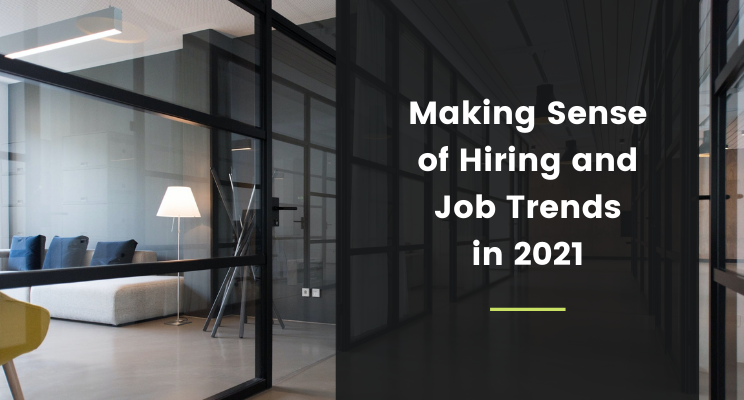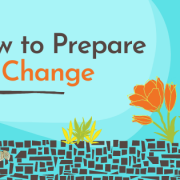Making Sense of Hiring and Job Trends in 2021
Career Tip Changing Careers Trends

We don’t exist in a bubble—knowing what is happening in our larger world is one of the many tools we can use to get where we want to go. Knowledge certainly is power!
There’s no topic I follow more closely than hiring and work/employment trends, and during this past year, I’ve had my eye on a few different areas. Of course, many of the trends we’re seeing now are in large part due to the pandemic. Companies had to pivot to accommodate most of their employees working from home—a trend that is definitely here to stay—and hiring took a backseat, with many positions being put on hold due to economic uncertainty.
As I scan the career landscape, a few things catch my eye. Here’s what I’m seeing for 2021 and a few things you need to know if you’re looking, or thinking about looking, for a new job in 2021.
- Contract work is on the rise. We’ve seen contract work (also called project or gig work, among other names) trending for years in technology, creative services, and professional services, but contract work has now reached most industries and professional areas. Many people have traditionally assumed their work would be full-time and permanent employment. But people are starting to view contract work as employers “renting” skills to solve specific problems or address needs in a just-in-time way.
As a job seeker, you should be clear about the problems you solve best and your most marketable skills, and then work to match them to specific employers (this is your target list). Even though contract/project/gig work might not be the way you’re used to working, you may find more opportunities if you open up your options, especially if it helps you to gain new skills or exposure. - Networking will be even more important to finding work. Your networking skills will have to be varied. First, gain the invaluable insider information about how people at your target companies actually get hired. Use your connections to suss out culture and organizational dynamics—the pros and cons. Also, with hiring and onboarding taking place remotely, hiring managers want to make sure they’ve got the right candidate. Not being able to meet candidates in person is a new experience, so the hiring process is taking longer and more interviews are required to make a decision.
- Video interviewing is the new norm. Video interview simulators are available online, but most charge a monthly fee. Check with your alumni career services office to see if they offer any mock interview tools—many do. You can go low-tech and practice with a friend. Have them record the session. Please don’t try and wing a video interview—you’ll find that certain habits are amplified and your energy translates differently. Practice and record yourself. I like this article as it covers the basics of video interviewing, like managing multiple screens, where to look, whether to wear headphones, and using screen proportions.
- You may need a career pivot depending on your industry. The industry you work in arguably matters now more than before. Some industries, like hospitality, tourism, or even educational services, aren’t coming back anytime soon, and there’s going to be a long-term supply (available candidates) versus demand (available jobs) imbalance for a while. Navigating a successful career pivot starts with being crystal clear about not only your most valuable transferable skills but also how they apply to the new industry you’re considering. Start talking with people who have made pivots into new industries. Do some self-exploration, and dream a little. If you’re going to pivot, why not do something you’ve always been curious about?
- Know your potential employer’s brand. Savvy employers are carefully managing their brand, so beware of the implied promise of rainbows, glitter, and unicorns. Whether it’s offering remote work, unlimited time off, or an inclusive culture, employers have a lot of incentive in how they portray themselves to potential employees. Listen to what they say and what they do. Being an “employer of choice” gives them an ample number of applicants, and if an applicant is trying to choose between several different employers, the employers’ brand might help tip the scales in their favor.
Be sure to ask questions that help you understand how work or decisions get done in the organization and what type of people are successful in the organization. If you’re interviewing, find out about the people who are interviewing you. Do they all have similar backgrounds? Do they ask relevant questions? Is it a conversation or an interrogation? Ask former employees about their experience. Do your due diligence to determine if the promises meet reality.
You probably wouldn’t buy a brand new car just from listening to the salesperson describe its features, would you? You’d do your own research, maybe even talk to owners of that car. The same goes for working in an organization—never forget that you’re trying to find the right fit for you too. - Remote work, in some form, is here to stay. We were forced to embrace remote work, and it certainly has enough benefits to become the norm, but a hybrid model (office time + work from home) is more likely. And of course, remote work policies will vary greatly from company to company.
If you decide to relocate while working remotely, know that not all companies will be staying 100 percent remote post-pandemic. I see a lot of remote workers move to a new city but often neglect to develop their local professional network. Sure, if we’re all working remotely for companies based in different states, being a part of your city’s network probably won’t matter as much; but people still hire those they know and like.
Also consider that since many people don’t like working from home, remote versus office work will now factor more heavily in the job search. Not every worker wants to blend home and work life. That means remote work will increase competition for some companies, geographies, and professional areas and decrease competition for others. - Gen X and baby boomer employment has been hit hard by this pandemic. Statistics show that older workers are losing jobs at a faster rate than younger workers. And let’s face it, age discrimination in hiring is a real thing.
If you’re in this age group and you’re employed, just be prepared. You don’t need to let fear paralyze you into doing nothing. Keeping your head down and plugging away at your work isn’t going to protect you from a layoff. Keep your network active. Stay current with software, and if you need to, invest in yourself. Engage on LinkedIn.
And if you’re in that demographic and unemployed, hang in there. Talk to as many people as you can, inside and outside your industry, to find out what skills and experience are most valued. Review your resume so it doesn’t scream your age. Find a few other job seekers and keep each other accountable and learn from each other.
Focus on your resilience. You’ve done hard things before, and if you have to make a change in 2021, you’ll do it.
Photo by Nastuh Abootalebi on Unsplash

I’m Stacey Lane: Career Coach | Transition & Career Strategist | Personal Brand Specialist
I help individuals with unique backgrounds find their perfect fit and effectively market themselves so they find work that is as interesting as they are.
Contact me to get started!



